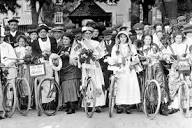In some of my earlier posts, I invoked my “Howard Cosell Rule.” It gives me the latitude to, if not the right, to write about something not related to bicycles, bicycling or even being in midlife.
The rule’s namesake, along with Don Meredith and Frank Gifford, was calling a game when New England Patriots kicker took to the field to boot a potential game-winning field goal against the Miami Dolphins.
Instead of helping to build suspense, he announced “an unspeakable tragedy” that came to him from ABC News: the murder of John Lennon. “Remember, this is just a football game, no matter who wins or loses,” he intoned.
While some praised him, many more criticized him. A similar scenario ensued a dozen years earlier when he used his “Speaking of Sports” radio program to talk about another “unspeakable tragedy” from the previous night: the assassination of Robert F. Kennedy, just two months after Martin Luther King Jr. was gunned down.
Now, I have never received similar backlash for discussing, for example, bell hooks, mainly because I am not the public figure Cosell was. Also, I suspect, most of my readers are at least sympathetic to my interests and proclivities even if we do not share them. On the other hand, many sports fans do not share Cosell’s views about society or culture or simply don’t want to hear about them when they tuned in for a football game.
All of this makes me wonder how readers responded to Matthew Miranda’s article. I suspect more than a few didn’t get past the byline: “I dunno how to write about the Knicks when the government is killing people.”
My guess is that Howard would have approved. Certainly, I do.
Jonathan Ross murdered Renee Good. Full stop. In spite of what Trump administration officials are saying, she did nothing to endanger him or anyone else. Moreover, said officials have given no plausible reason for sending Ross and fellow ICE agents to Minnesota, where Good met her demise. Oh, wait a minute, the Land of 10000 Lakes has welcomed more—wait for it—Somalis—than any place else. Dark-skinned people in a land of Vikings. Oh, the horror! (sarcasm)
That folks like Ross can kill innocent people with impunity is hardly unique in history. What makes it, and the killing of alleged drug traffickers in the Caribbean and eastern Pacific, especially chilling—and why comparing ICE to the Gestapo is only partly accurate—is that Ross and his colleagues voluntarily signed up for their jobs. Hitler’s agents were recruited, sometimes forcibly, from police and military units, the latter of which were conscripted.
Oh, and agents of the Gestapo (and the SS, its umbrella organization) didn’t wear masks.





















.webp)








